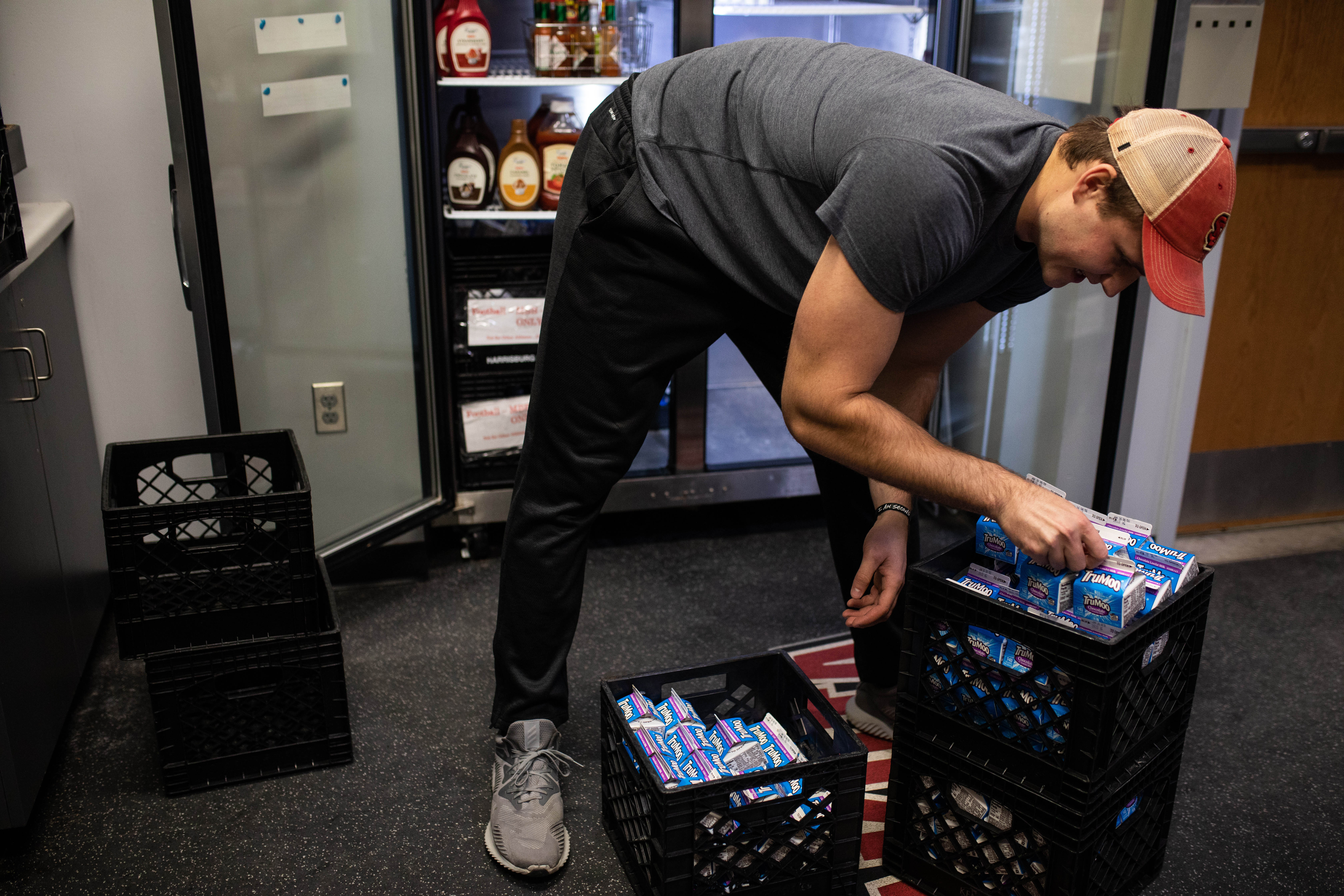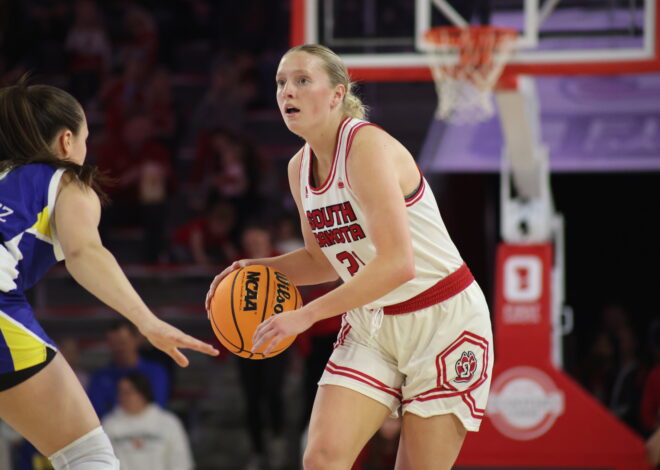
Cleaning to coaching: USD athletics’ weight room interns
Like many college athletes, Ben Hammer begins his day before the sun rises.
The senior thrower from Dell Rapids, S.D. awakes around 5 a.m. and takes a walk from Coyote Village to the weight room inside the Sanford Coyote Sports Center. Hammer’s daily workout isn’t scheduled until the afternoon following class, but it’s his job to prepare the facility and nutrition bar for the first wave of athletes enduring theirs.
It’s part of Hammer’s responsibility as a weight room intern for the USD athletic department.
“I’ll get there at about 5:40-ish in the morning. We’ll get the weight room reset, get the weights where they need to be. The football team will be in by six–football or golf or whatever team–but normally somebody’s starting up by six. We’ll make sure the nutrition stations and snacks and shakes are ready to go once they’re finished with their workouts,” he said.
After that, the fun part begins: coaching. Hammer, who works primarily with the football team, said interns fall into coaching a certain team or sport, but like any job, it all begins with a learning curve.
“Right away, we’re there so we can see the coaches coaching through. You have to learn by watching because it’s such a hands-on position. You sit back and hear what the coaches are telling the athletes,” Hammer said. “And then you’ll be able to work with and coach the athletes with their technique and stuff like that.”
Head strength and conditioning coach Clete McLeod, who joined the athletic program in early 2018, instructs a group of six undergraduate interns in his weight room. In a way, it’s a class of his own.
“It’s a lab. When they’re in here, there are remedial tasks they have to do, like cleaning and set up, but when there are teams in here training, it’s absolutely lab time,” McLeod said. “They’re tasked with reading what’s going on and asking questions, setting up and breaking down workouts.”
Senior hurdler Alanisse Williams, a kinesiology major from Buckeye, Ariz. who last fall interned under the strength and conditioning staff, said she expected the small tasks that come with an internship, but enjoyed her work with the athletes, specifically the softball team.
“I gravitate towards women’s fitness and strength. I think it’s a lot easier for me to relate and communicate to them when it comes to coaching and anything else,” she said via text. “I actually became friends with a couple of them when I was done.”
Both Hammer and Williams said they aim to enter the field of sports medicine following graduation, and the internship allows them to combine their athletic and academic lives into one.
“I talked to [McLeod] quite a few times in the weight room when we’re training and he’s always super energized about people who get excited about strength training,” Hammer said. “He was looking for some people who’d want to handle the workload.”
Stuck between athlete and coach, between student and employee, the daily commitments are heavy. And on weekends, Williams adds “bartender” to the list.
“It’s very difficult for me on certain days. Every morning I map out how my day is going to look by the hour and make sure I fit in practice, work, homework, and social time,” she said. “I’ve done it since sophomore year and I’ve been doing okay.”
McLeod said he tries his best to ease the workload, but if mismanaged, it can “take a toll.”
“If I don’t manage how much time they’re on their feet, and how much they’re having to coach, then it can start to affect their training. You’re at a high level of engagement the entire time, and for a person who’s competing, it can show up in their performance, and that’s not a good thing,” he said.
Tayler Karas, a senior kinesiology major with a minor in psychology, interned last summer before her soccer season began in the fall.
“I was supposed to coach, but not over-coach. I said the basics, like ‘make sure you go all the way to line, make sure you’re doing the fundamentals’.”
Starting at 5 a.m., Karas worked with the football and women’s basketball teams throughout the day until 5 p.m. For someone who hadn’t coached or trained with male athletes before, she said preparing the football team for their season was much different from any other sport.
“Football is a lot different. With women’s basketball you can talk them through it, but with football, you’re supposed to use one word or short words because they’re not really listening to you; they’re in the zone,” she said. “I think the biggest thing that is unique with working with football players is how loud and intense the environment is. All the guys are hyping each other up and pushing the guy next to them.”
The turbulent climate took some getting used to, she said.
“Being a female in that atmosphere, I felt a little inferior,” she said. “But Clete and the rest of the strength coaches kept saying ‘you need to assert your dominance because if you think you’re inferior, they’re going to treat you as inferior’.”
Coaching is a system of mental tricks on the body, and McLeod said many don’t understand its aftermath.
“I tell our folks, if you’re not completely drained at the end of an hour of coaching, you’re not doing it right,” he said. “So for them to be able to balance the mental and physical aspects of coaching but also having to train and perform at the highest level is really, really impressive.”
Hammer spends close to 40 hours a week in the weight room, as do the other interns. He said he hasn’t grown tired of it because he’s learning to be a better athlete every day.
“That’s what I was hoping from the internship. I would be immersed in people making their athletes better,” he said. “You get to experience, for six-to-eight hours a day, athletes getting bigger and stronger and it helps get that into your mind.”
The same goes for Williams and her lifting scheme.
“The internship definitely made me a better athlete. Most definitely a better lifter,” Williams said. “Of course, I don’t know everything but it’s a lot easier to help my teammates when it comes to lifting in the weight room and also apply the corrections to my own lifting.”
Karas said the internship educated her on both coaching athletes and becoming an easier athlete to coach.
“After that internship, going into lifting during the fall, it made me think about the little things that I hadn’t before,” she said. “Being behind the scenes helped me see firsthand all the work that’s put into making us into better athletes. I’ve become even more grateful for our staff that motivated me to give every workout 100 percent.”
Interested in physical therapy and studying for a license in strength and conditioning, Karas has learned a lot from her first day as an intern in the weight room, which included drying its floor at 5 a.m. after a broken refrigerator soaked it in water. But during her time in an atmosphere unlike most, Karas said she was comfortable.
“The coaches are very laid back and they’re also very smart, so the conversations we had between lifting sessions made it a really good place to work,” she said. “It was an environment where I could be myself.”

